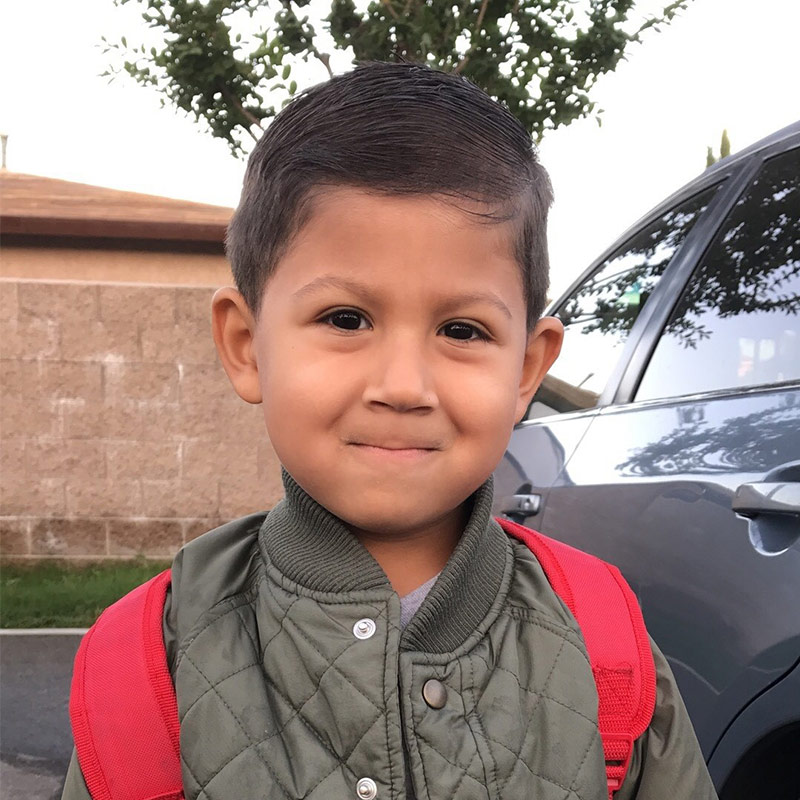Early one morning, 3-year-old Santiago Soto woke up with a swollen face and throat. His mother, Jasmine Monjarez, had never seen this happen before, so she went straight to her local hospital. The diagnosis was clear: Santiago was suffering from an anaphylactic allergic reaction. Anaphylactic reactions occur suddenly due to allergens, causing the body to overproduce chemicals and can be life-threatening.
After being treated with an EpiPen® and a steroid IV, Santiago’s swelling subsided and he was back to normal. But later that week, another reaction sent him back to the emergency room. The hospital decided it would be best to send Santiago to MemorialCare Miller Children’s & Women’s Hospital Long Beach for further treatment.
They called the Transport Program, which is available 24-hours a day, seven-days a week. The Transport Program has a specialized care team that is equipped to safely transport infants, children, young adults and high-risk expectant mothers who need emergency life-saving specialty care. The team provides the same quality of care in an ambulance or helicopter that patients would receive at Miller Children’s & Women’s.
The Miller Children’s & Women’s Transport team consists of members that aren’t usually included on an Emergency Medical Transport (EMT) ambulance. Most EMT’s do not have pediatric or prenatal training. However, the Transport Program includes registered nurses and respiratory care practitioners cross-trained to provide specialty care to infants, children and pregnant moms. This team is equipped to apply life-saving care in emergency situations.
Shortly after receiving the call, the transport team arrived and met with Santiago, his family and care team to discuss his condition. The team took time to introduce themselves and their roles to ensure Santiago and his family knew exactly what was happening. This helped lessen the family’s fears in this stressful situation. Then, Santiago was taken to Miller Children’s & Women’s by a specialized transport ambulance.
“The transport team was so nice to us,” says Jasmine, Santiago’s mom. “There was a movie playing for Santiago in the ambulance and the team was even chatting with him. This helped him feel safe.”
While the team is dedicated to providing quality care, they also understand the emotional aspect of providing medical care to children. This means informing the patient and family about what’s going on, in a way that they understand.
“On the transport team, we’re involved in these situations often,” says Rachel Sriwarodom, RN, BSN, Transport Program. “We’ve become experts at giving emergency care and we’re very calm in emergency situations. Although it’s great to be as prepared as we are, it’s also important to remember that there’s a child on the other end that is scared and doesn’t understand what’s going on – and a family that feels the same way.”
The team also comforted Jasmine. “I sat in the passenger seat with the head nurse,” recalls Jasmine. “She spoke to me about what the next steps would be when we arrived and paid attention to my concerns.”
Santiago was admitted to the Cherese Mari Laulhere Pediatric Intensive Care Unit at Miller Children’s & Women’s. When Jasmine arrived with her son, she was amazed with the care they received. “It was nice to be somewhere that specializes in just children.” “When Santiago had questions, they answered him and included him in the conversation.”
After being treated with allergy medication and steroids for swelling, Santiago was brought to a stable condition. He stayed with Miller Children’s & Women’s for two days. Blood work was taken to address what exactly caused his reaction.
“I had never gone to Miller Children’s & Women’s before,” says Jasmine, “but I’m really happy with their care. I’m glad we were taken there.”

